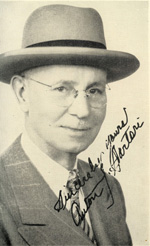LeMars Globe-Post
November 25, 1954
“O Lord! That lends me life,
Lend me a heart replete with thankfulness!”
~King Henry VI.
The building now long known as the home of LeMars Lodge No. 428, B.P.O.E.; possibly even better known as the Elks Club, was originally built as a hotel. Even before alterations made by the Elks, it was quite a handsome structure and had been named the “Senate Hotel.” As a hotel, the Senate was comparatively short-lived, but no doubt its promoters held high hopes for its success because the location had been the site of an earlier hotel, the St. Lawrence House.
-o.p.-
I have but a faint recollection of the St. Lawrence House. It was a frame structure with a long porch along its north side, and with nothing to obstruct the view of the then downtown section. It was perhaps built in the early 1880’s and would have had an unobstructed view of the downtown area because the old combination depot-hotel on the site of the present Illinois Central freight depot was destroyed by fire in May of 1878.
-o.p.-
I have been curious as to the location of one of three hotels listed as going concerns in 1870, the St. Cloud Hotel. It seems to have gone out of business without leaving a trace. However, its name may have been changed and then gone on doing business under the new name.
-o.p.-
The present Armory building occupies what was formerly the site of the Mickley House, also a wooden structure, and operated as a hotel by the Mickley family. Across the street on the corner later known as the Brauch home, stood a three-story frame building known as the Windsor Hotel.
-o.p.-
When I was just a boy, I ate what I believe to have been my first hotel meal at the Windsor as a guest of my father’s clerk, Wallace McArthur. A few years later, I came to know the then proprietor, a man by the name of Matthews. He was a cantankerous old fellow who smoked a cob pipe. However, he may have had his mellower moments. I remember hearing him say that when he got up in the morning the first thing he did was to put on his shirt. And this, I hope to be able to point out was, because of his fondness for that old corn cob pipe.
-o.p.-
In those days, business men usually wore stiff-bosomed white shirts. Later on came a style known as the “coat shirt,” but early stiff-bosomers had to be pulled on over the head. This required use of both hands and the vent at the top of the shirt would hardly allow for a man’s head with a corn cob pipe in his mouth. By putting on his shirt first, he could light up his pipe and finish dressing without removing the pipe from his mouth.
-o.p.-
Both the Windsor Hotel and the Mickley House enjoyed first-class patronage in their day, but gradually both bogged down and finally went out of business. However, the old Mickley House briefly came back to life when it took the name of its former competitor, the Windsor. It remained a going concern for a few years under the changed name, and is perhaps best remembered for the unusual number of fire alarms turned in from that location. And later, when the property had become somewhat of an eyesore, locals would chide our fire department for their efficiency in dousing the flames. (Wasn’t this later known as the Brunswick Hotel? ~Query by the Editor of The Globe-Post.)
-o.p.-
While working over the subject of early-day hotels, it would at least make for added reading if mention were made of the first hotel in the Big Sioux Valley. In 1868, one William Tremaine of New York state arrived in what was later to be the Akron area, and became the landlord of the Sioux Valley House, the first hotel in that section.
-o.p.-
The Sioux Valley House had been built of hewed logs, cut along the banks of the Big Sioux River. It consisted of two large rooms – one upstairs and one down. However, it was nothing uncommon for this hostelry to accommodate as many as twenty lodgers a night, and there was always an abundance of food. Although the floor may have been the traveler’s only bed, nobody grumbled as even such accommodations were often at a premium.

